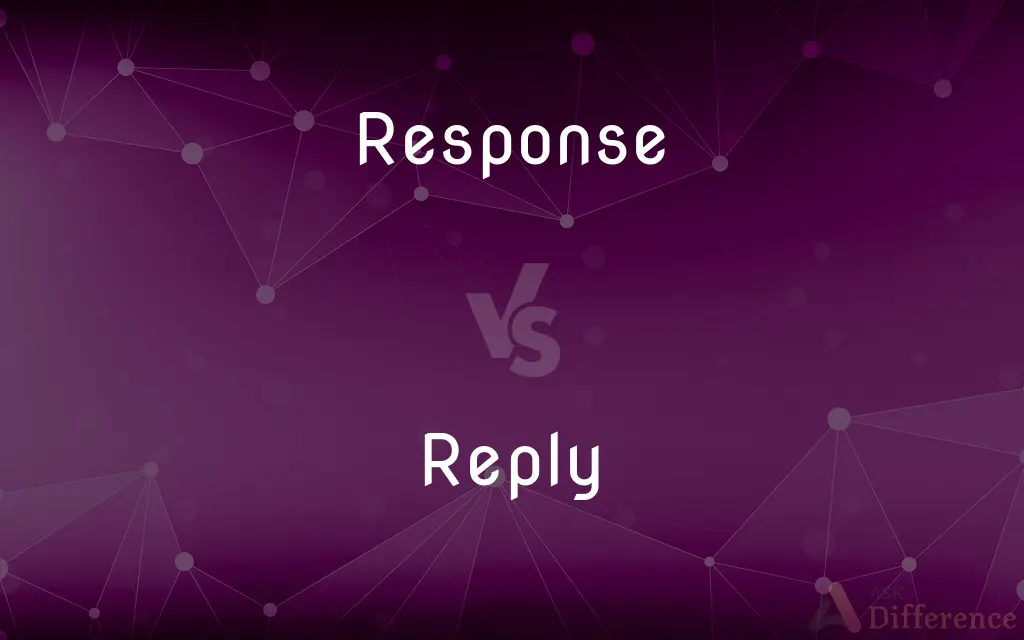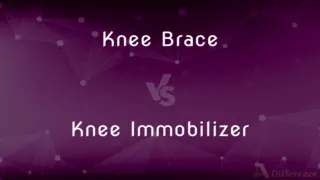Response vs. Reply — What's the Difference?
Edited by Tayyaba Rehman — By Fiza Rafique — Published on April 1, 2024
A response is a broader term for any reaction or answer to a stimulus or question, while a reply specifically refers to an answer given in direct return to a question or statement.

Difference Between Response and Reply
Table of Contents
ADVERTISEMENT
Key Differences
A response encompasses a wide range of reactions, including verbal, written, or physical actions taken in answer to something. It can be immediate or delayed, emotional or logical, and does not necessarily have to directly address a query or statement but is triggered by it. On the other hand, a reply is a type of response that is more specific and direct, often used in verbal and written communication. It directly addresses a question or comment and is usually expected to be relevant and to the point.
While responses can be instinctual or reflective, encapsulating a broad spectrum of reactions from physiological responses to complex analyses, replies are generally considered to be more deliberate and focused on addressing the content of the initial communication. A response can be as varied as a laugh, a gesture, a detailed analysis, or an action taken as a result of being prompted by an event or statement. In contrast, a reply is typically constrained to the context of a dialogue or communication, aiming to continue the conversation or provide the sought-after information or feedback.
In formal settings, such as professional communication, legal situations, or academic discussions, the distinction becomes more pronounced. A legal response, for example, may involve a comprehensive argument or presentation of evidence, while a legal reply might address specific points raised in a previous legal document or argument. Similarly, in academic settings, a response to a paper could involve a broad discussion of its themes, methods, or implications, whereas a reply might specifically address questions or criticisms raised by reviewers.
The emotional or subjective nature of responses also differentiates them from replies. Responses can be deeply personal and vary widely among individuals, influenced by personal beliefs, experiences, and emotions. Replies, while they can also be influenced by personal perspective, are more often constrained by the need for clarity, relevance, and the norms of the communicative exchange.
Comparison Chart
Definition
Any reaction or answer to a stimulus or question.
An answer given in direct return to a question or statement.
ADVERTISEMENT
Scope
Broad, encompassing various types of reactions.
Narrower, specifically related to direct communication.
Nature
Can be emotional, physical, or verbal.
Primarily verbal or written.
Context
General, can occur in any situation.
Usually occurs within the context of a dialogue or communication.
Expected Content
May not directly address a query or statement.
Expected to be relevant and to the point.
Formality
Can vary from casual to formal.
Often formal and structured, especially in professional settings.
Examples
Laughing at a joke, implementing feedback.
Answering a question in an interview, replying to an email.
Compare with Definitions
Response
Can encompass physical actions.
Jumping in response to a loud noise.
Reply
Primarily verbal or written.
Replying to a comment on a social media post.
Response
A general reaction to stimuli.
Smiling in response to a compliment.
Reply
A direct answer to communication.
Replying to a text message with specific information.
Response
Reflective or emotional reactions.
Feeling sad in response to a movie.
Reply
Often follows a question or request.
Replying to an email inquiry about a job opening.
Response
Broader, encompassing feedback or actions.
Changing a policy in response to public demand.
Reply
Structured and relevant to the initial statement.
A politician replying to a debate question.
Response
Varied, not limited to direct communication.
Writing a poem in response to a personal experience.
Reply
Context-specific, continuing a conversation.
Replying to customer feedback with a solution.
Response
The act of responding.
Reply
To speak or write as a reaction to a question or other prompting.
Response
A reply or an answer.
Reply
A word or a series of words spoken or written in reaction, as to a question or request.
Response
An answer or reply, or something in the nature of an answer or reply.
Reply
To give a written or spoken response, especially to a question, request, accusation or criticism; to answer.
Response
The act of responding or replying; reply: as, to speak in response to a question.
Reply
To make a return in words or writing; to respond; to answer.
O man, who art thou that repliest against God?
Response
The act of responding.
Reply
Figuratively, to do something in return for something done; as, to reply to a signal; to reply to the fire of a battery.
Response
A statement (either spoken or written) that is made in reply to a question or request or criticism or accusation;
I waited several days for his answer
He wrote replies to several of his critics
Reply
To return for an answer.
Lords, vouchsafeTo give me hearing what I shall reply.
Response
The speech act of continuing a conversational exchange;
He growled his reply
Reply
Reply or respond to;
She didn't want to answer
Answer the question
We answered that we would accept the invitation
Common Curiosities
Is a reply expected to be factual?
Generally, replies are expected to be factual and relevant to the query or statement that prompted them.
Can a response be non-verbal?
Absolutely, responses can be non-verbal, such as gestures, facial expressions, or actions.
Can the same statement be both a response and a reply?
Yes, if a statement is made as a reaction to something and directly addresses a question or comment, it can be both a response and a reply.
Do responses and replies play different roles in communication?
Yes, responses facilitate a broad range of reactions in communication, enriching the exchange with personal or contextual depth, while replies focus on maintaining the flow of direct dialogue.
Can a reply be part of a response?
Yes, a reply can be part of a larger response, especially if the response includes additional information or actions beyond directly answering a question or comment.
How does the intention differ between a response and a reply?
The intention behind a response can be broad, ranging from expressing an emotion to providing feedback, whereas a reply specifically aims to answer or address a question or statement.
Is every reply a response?
Yes, every reply is a form of response, specifically tailored to address direct communication.
Are responses always immediate?
No, responses can be immediate or delayed, depending on the context and the nature of the stimulus.
How do cultural differences affect responses and replies?
Cultural norms can influence the manner, content, and timing of both responses and replies, affecting communication styles and expectations.
Why is distinguishing between responses and replies important?
Understanding the distinction helps in tailoring communication effectively, ensuring clarity, appropriateness, and the intended impact of the exchange.
Share Your Discovery

Previous Comparison
Acetone vs. Isopropyl Alcohol
Next Comparison
Knee Brace vs. Knee ImmobilizerAuthor Spotlight
Written by
Fiza RafiqueFiza Rafique is a skilled content writer at AskDifference.com, where she meticulously refines and enhances written pieces. Drawing from her vast editorial expertise, Fiza ensures clarity, accuracy, and precision in every article. Passionate about language, she continually seeks to elevate the quality of content for readers worldwide.
Edited by
Tayyaba RehmanTayyaba Rehman is a distinguished writer, currently serving as a primary contributor to askdifference.com. As a researcher in semantics and etymology, Tayyaba's passion for the complexity of languages and their distinctions has found a perfect home on the platform. Tayyaba delves into the intricacies of language, distinguishing between commonly confused words and phrases, thereby providing clarity for readers worldwide.
















































